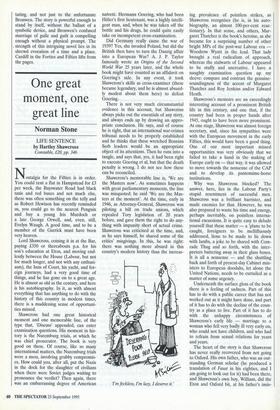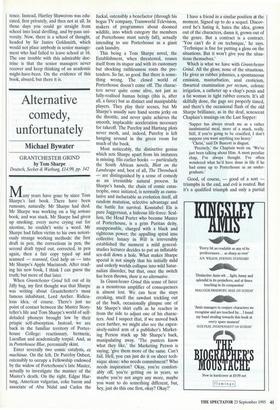One great moment, one great line
Norman Stone
LIFE SENTENCE by Hartley Shawcross Constable, £20, pp. 346 Nostalgia for the Fifties is in order. You could rent a flat in Hampstead for £3 per week, the Bayswater Road had black taxis and red buses and not much else, there was often something on the telly and as Robert Hewison has recently reminded us, you could go to the nearest Penguin and buy a young Iris Murdoch or a late George Orwell, and, even, still, Evelyn Waugh. A good time, and to be a member of the Garrick must have been very heaven.
Lord Shawcross, coining it in at the Bar, paying £350 or thereabouts p.a. for his son's education at Eton, and moving end- lessly between the House (Labour, but not for much longer, and not with any enthusi- asm), the Inns of Court, his yacht, and for- eign journeys, had a very good time of things, and he has gone on to a great age. He is almost as old as the century, and here is his autobiography. In it, as with almost everything that has anything to do with the history of this country in modern times, there is a maddening sense of opportuni- ties missed.
Shawcross had one great historical moment and one memorable line, of the type that, 'Discuss' appended, can enter examination questions. His moment in his- tory is the Nuremburg trials, at which he was chief prosecutor. The book is very good on these. Of course, like so many international matters, the Nuremburg trials were a mess, involving grubby compromis- es. How could you, after all, put the Nazis in the dock for the slaughter of civilians when there were Soviet judges waiting to pronounce the verdict? Then again, there was an embarrassing degree of American naIvet6. Hermann Goering, who had been Hitler's first lieutenant, was a highly intelli- gent man, and, when he was taken off the bottle and his drugs, he could quite easily take on incompetent cross-examination.
Did Germany really cause the war of 1939? Yes, she invaded Poland, but did the British then have to turn the Danzig affair into a European War? A. J. P. Taylor famously wrote an Origins of the Second World War 25 years later, and the whole book might have counted as an affidavit on Goering's side. In any event, it took Shawcross's skills as cross-examiner (these became legendary, and he is almost absurd- ly modest about them here) to defeat Goering.
There is not very much circumstantial evidence in this account, but Shawcross always picks out the essentials of any story, and always ends up by drawing an appro- priate conclusion. He says, and of course he is right, that an international war-crimes tribunal needs to be properly established and he thinks that these wretched Bosnian Serb leaders would be an appropriate object of its attentions. Then he runs into a tangle, and says that, yes, it had been right to execute Goering et al, but that the death penalty is wrong. I do not see how these can be reconciled.
Shawcross's memorable line is, 'We are the Masters now'. As sometimes happens with great parliamentary moments, the line was misquoted: he said 'We are the Mas- ters at the moment'. At the time, early in 1946, as Attorney-General, Shawcross was piloting a bill on trade unions, which repealed Tory legislation of 20 years before, and gave them the right to do any- thing with impunity short of actual crime. Shawcross was criticised at the time, and, as he says himself, he shared some of the critics' misgivings. In this, he was right: there was nothing more absurd in this country's modern history than the increas- I'm feckless, I'm lazy, I deserve it.' ing prevalence of pointless strikes, as Shawcross recognises (he is, in his auto- biography, an almost 100-per-cent reac- tionary). In that sense, and others, Mar- garet Thatcher is the book's heroine, as she became for a surprising number of other bright MPs of the post-war Labour era Woodrow Wyatt in the lead. That lady brought a real radicalism of approach, whereas the stalwarts of Labour' appeared to be stuffy and uncreative. I have a naughty examination question up my sleeve: compare and contrast the genuine- soundingness of the accent of Margaret Thatcher. and Roy Jenkins and/or Edward Heath.
Shawcross's memoirs are an exceedingly interesting account of a prominent British life in this century, and one that, if the country had been in proper hands after 1945, ought to have been more prominent. At one stage, Shawcross was almost foreign secretary, and, since his sympathies were with the European movement in the early Fifties, this would have been a good thing. One of our most important missed opportunities was very obviously that we failed to take a hand in the making of Europe early on — that way, it was allowed to move towards the nonsense of the CAP and to develop its pantomime-horse institutions.
Why was Shawcross blocked? The answer, here, lies in the Labour Party's stupid resentment of successful men. Shawcross was a brilliant barrister, and made enemies for that. However, he was also prepared to waste his time and energy, perhaps inevitably, on pointless interna- tional excursions. It is quite easy to delude yourself that these matter — a 'plane to be caught, foreigners to be mellifluously addressed, lions to be made to lie down with lambs, a joke to be shared with Com- rade Thug and so forth, with the inter- preters battering away in their glass boxes. It is all a nonsense — and the shuttling back and forth of present-day Cabinet min- isters to European doodahs, let alone the United Nations, needs to be curtailed as a matter of some urgency.
Underneath the surface gloss of the book there is a feeling of sadness. Part of this has to do with a public career that has not worked out as it might have done, and part of it has to do with the decline of the coun- try as a place to live. Part of it has to do with the unhappy circumstances of Shawcross's early life — marriage to a woman who fell very badly ill very early on, who could not have children, and who had to refrain from sexual relations for years and years.
The heart of the story is that Shawcross has never really recovered from not going to Oxford. His own father, who was an out- standing German scholar (he produced a translation of Faust in his eighties, and I am going to look out for it) had been there, and Shawcross's own boy, William, did the Eton and Oxford bit, at his father's insis- tence. Instead, Hartley Shawcross was edu- cated, first privately, and then not at all. In those days you could go straight from school into local devilling, and by-pass uni- versity. Now, there is a school of thought, headed by Sir Janies Goldsmith, which would not place anybody in senior manage- ment who had failed to leave school at 16. The one trouble with this admirable doc- trine is that the senior managers never recover and keep thinking of an academic might-have-been. On the evidence of this book, absurd, but there it is.



































































 Previous page
Previous page